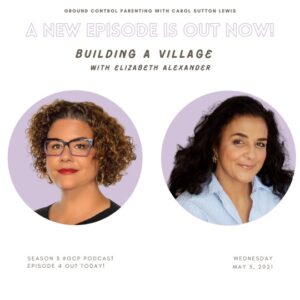I can’t wait for you to hear the next #GCP Podcast episode, which is out TODAY! In this episode I talk with Elizabeth Alexander–– President of the Mellon Foundation, poet, author, educator, a true Renaissance Woman–– about how to talk with our kids about money and philanthropy, the parenting lessons she received from her parents and her late husband and how they continue to guide her, and so much more.
You may know of Elizabeth from her work with the Mellon Foundation, from her award winning memoir “Light of the World”, or from her masterful delivery of her poem “Praise Song for the Day” at President Obama’s inauguration, but in this episode she brings the parenting wisdom you’ve not heard before! Listen to Building A Village with Elizabeth Alexander on the #GCP podcast page, on Apple Podcasts or on your favorite streaming platform.
We begin this episode with Elizabeth’s fascinating and inspirational personal story, which has its roots in parenting. She explains how she built upon the strong educational and moral legacies established by her parents and grandparents to chart her own path to success (she wanted to be a poet “but there is no job called ‘poet’”). Elizabeth shares her joy of discovering a kindred spirit in her artist and chef husband, Ficre Ghebreyesus. She reveals how she had to rebuild her parenting village when her beloved husband died suddenly in 2012 when her sons were 12 and 13. You’ll hear how that village helped her continue to raise her sons to become wonderful young men, and how we can all feel stronger and supported when we nurture our parenting communities. She’s so thoughtful, joyful, and smart–you won’t want to miss this one!
Here is a sneak peek into our conversation, as Elizabeth talks about a parenting issue that especially worries her these days:
As we know, being over-policed, racism, disproportionate violence, all these things are not new. But what I do think is new …is that [our children] are seeing this. It is replicated. It is filmed. We are seeing this over and over and over and over again with all of their seeing it. They’ve seen it 20 times on the school bus before they get to us. They have looked at black people, at black young men, black children, at black women being murdered…. And so we have all become used to it. But I think what we have to stop and say is, no, this is this is traumatizing. You know, this is traumatizing, so how do we slow it down, how do we talk about it? How do we make room for their feelings?
Want to hear more? Tune in to hear the full episode. And please don’t forget to subscribe, rate, review and share #GCP Podcast!!






